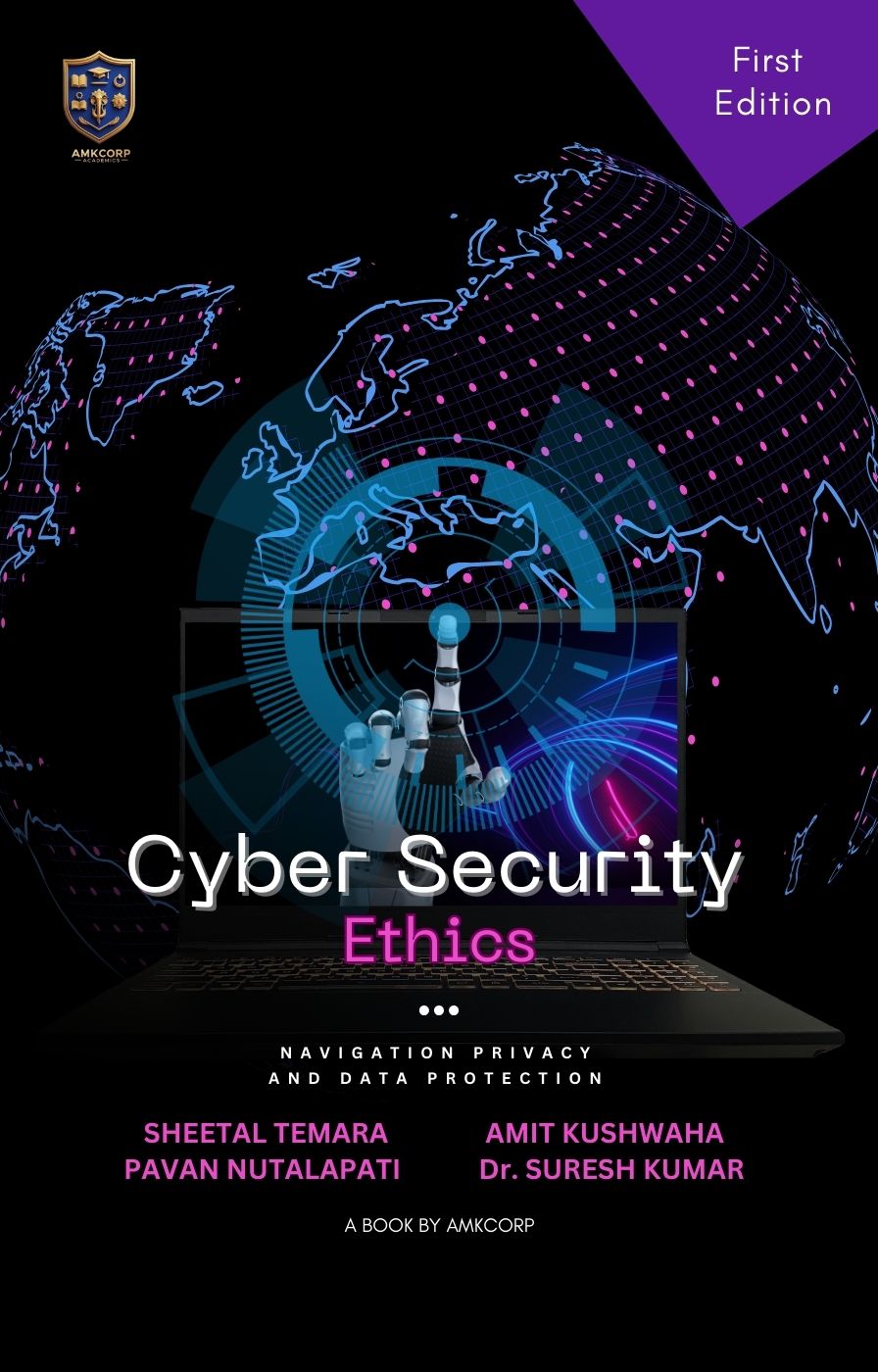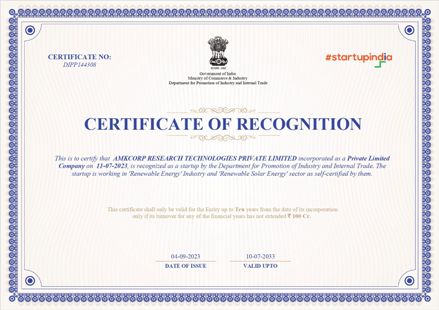

₹ 2299.00
$ 220.00
ORDER PRINT

CYBER SECURITY ETHICS
NAVIGATION PRIVACY AND DATA PROTECTION
AUTHOR(S) -
SHEETAL TEMARA, AMIT KUSHWAHA, PAVAN NUTALAPATI, Dr. SURESH KUMAR
DOI – 10.61909/AMKEDTB052541
Genre/Subject – Computer Science, AI, Cyber Security, Ethical Standards, Ethics, Data Protection
Book code – AMKEDTB052541 pgs: 270
ISBN(E) – 978-93-6556-430-3
Published – 19/05/2025
ISBN(P) – 978-93-6556-083-1
Published – 22/05/2025
AUTHOR(S)

SHEETAL TEMARA
Ms. Sheetal Temara is an Information Security professional with an extensive background in Penetration Testing and Vulnerability Assessments spanning various applications and domains. She is currently pursuing a doctoral degree in Information Technology at University of the Cumberlands. Her academic journey also includes a Master of Science degree in Computer Engineering from Oklahoma City University and a Bachelor of Technology in Information Technology from India. In her current role as Cyber Security Research Scientist, Sheetal demonstrates her expertise in penetration testing, identify security vulnerabilities for the organizational networks, application systems, hardware infrastructure and emerging technologies to improve the enterprise information security posture. She excels in conducting security risk assessments ensuring compliance with corporate information security policies and communicating risks effectively to stakeholders. Prior to her current position, Sheetal served as a Security Engineer where she conducted dynamic application security testing and provided expert guidance on security vulnerabilities and risks to development teams. She has extensive experience in utilizing various penetration testing tools and possesses advanced skills in programming languages. With a passion for cybersecurity and a dedication to advancing the field, Sheetal’s research interests incline toward the development of innovative solutions to address emerging cyber threats. She actively contributes to the academic community through her research publications and publishes her academic work on platforms such as Research Gate. Outside of her professional endeavours, Sheetal is committed to sharing her knowledge and expertise with others. As an author, she aims to empower readers with practical insights and strategies to enhance their understanding of cybersecurity and strengthen their defenses against evolving threats.

AMIT KUSHWAHA
With an impressive track record spanning over 15 years, Mr. Amit Kumar Kushwaha stands as a paragon of experience and innovation. Armed with a Master’s in Thermal Engineering and a Bachelor’s in Automobile Engineering, his expertise embodies a perfect synergy of technical brilliance and creative thinking. As the driving force behind his company, Amit’s dynamic leadership propels his team towards excellence. Beyond the boardroom, his fervent commitment to academia and research shines brightly. Active participation in scholarly pursuits reflects his dedication to ongoing learning and intellectual growth.

PAVAN NUTALAPATI
Mr. Pavan Nutalapati is a Project Lead at Oracle, where he leverages his expertise in Distributed Systems, Cybersecurity, Cloud architecture, and Disaster Management primarily within the fintech and public sector. With over 15 years of experience, Pavan plays a pivotal role in developing and implementing secure and scalable cloud solutions for financial technology applications.
At Oracle, Pavan focuses on designing and Developing robust security frameworks that protect sensitive financial data and ensure compliance with industry regulations. His work includes the implementation of encryption protocols, secure access controls, and continuous monitoring systems that have reduced security breaches by 35% in the past year. Additionally, Pavan has been instrumental in optimizing cloud infrastructure, leading initiatives that have increased system efficiency by 40% while reducing operational costs by 25%.
Pavan’s expertise in disaster management is evident in his development of comprehensive disaster recovery plans. He has successfully engineered solutions that guarantee less than 15 minutes of downtime during critical system failures, significantly enhancing the reliability and resilience of Oracle’s fintech platforms. His contributions have also led to a 50% improvement in recovery time objectives (RTOs), ensuring that financial services remain operational with minimal disruption.
Working closely with cross-functional teams, Pavan integrates advanced security measures into Oracle’s cloud-based applications, safeguarding them against evolving cyber threats. His ability to align technological advancements with the dynamic needs of the fintech industry makes him a crucial asset to Oracle, where his work continues to strengthen the security and reliability of its services.

Dr. SURESH KUMAR
Dr. Suresh Kumar is currently working as an Assistant Professor in the B.S. Anangpuria Institute of Law, Faridabad, Haryana. He worked as an Assistant Professor in the Swami Devi Dayal Law College Panchkula and IEC University Baddi, Himachal Pradesh. He has done Ph.D. in 2022 from Department of Laws, Punjab University Chandigarh. He has done LL.M. in 2013 from Department of Law, Kurukshetra University Kurukshetra. He has qualified UGC NET in 2012. He has done LL.B. in 2009 from Department of Law, Mahrishi Dayanand University, Rohtak, He has been appointed as editorial board members in many journals. He has published many research papers in MDU Law Journal, UILS Journal Panjab University, UGC Care, National, International and Referred Journals. He has published many chapters in the books. He has presented many papers in National and International Conferences/Seminars. He has published three patents in Legal Research, Election Commission, and UK E-Commerce.
ABOUT BOOK / ABSTRACT
Cyber Security Ethics- Navigation Privacy and Data Protection is a comprehensive guide designed for professionals, students, and organizations looking to understand the ethical dimensions of cyber security in a rapidly evolving digital world. This book delves into the complex intersection of technology, ethics, and law, offering a balanced perspective on how cyber security practices must align with moral responsibility and societal expectations. It provides a deep exploration of key ethical issues that arise in the protection of digital privacy, the handling of sensitive data, and the response to cyber threats, making it an essential resource for anyone navigating the modern cyber landscape.
Organized into twelve in-depth chapters, the book begins with an introduction to the foundational concepts of cyber security ethics, setting the stage for a discussion on ethical frameworks, dilemmas, and professional responsibilities. As the digital age redefines privacy, Chapter 2 addresses the ethical challenges surrounding data privacy and surveillance, reinforcing privacy as a fundamental right. The subsequent chapter examines global data protection laws, including the GDPR and CCPA, and how ethical compliance plays a vital role in upholding user trust and corporate responsibility.
Chapters 4 and 5 explore the ethical implications of cyber security threats and surveillance practices. From ethical hacking to the fine line between security and privacy, readers are encouraged to critically analyze how security decisions impact civil liberties. The book emphasizes that ethical strategies are essential for proactive threat prevention and transparent incident response. In Chapter 6, the focus shifts to social responsibility, highlighting how corporations must act ethically in handling consumer data, ensuring transparency, and addressing data breaches responsibly.
The latter half of the book explores specialized ethical concerns in workplace monitoring, employee privacy, and insider threats. It addresses how organizations can foster a culture of ethical awareness through training and policy. The book also tackles the growing influence of artificial intelligence and automation in cyber security, exploring the risks of algorithmic bias, lack of transparency, and the need for human oversight. Globalization introduces further complexity, as Chapter 10 discusses ethical challenges in cross-border data governance and digital colonialism.
The book pays special attention to the public sector, where ethical governance, national security, and public trust are critical themes. It ends with a forward-looking vision in Chapter 12, forecasting emerging ethical challenges in quantum computing, digital identity, AR/VR, and standardization. The final chapter reinforces the need for continuous ethical education, preparing the next generation of cyber professionals to tackle evolving digital threats with integrity and responsibility.
Written in an accessible yet authoritative style, Cyber Security Ethics: Navigation Privacy and Data Protection is an essential addition to the library of any cyber security practitioner, educator, policymaker, or technologist. Whether you’re seeking to build ethical awareness, ensure regulatory compliance, or develop trustworthy systems, this book offers the insights and tools needed to navigate the ethical complexities of today’s interconnected world.
EDITORS

Dr. ANIRBAN MANDAL
Dr. Anirban Mandal obtained his B.Sc Honours (Physics) from University of Calcutta in 1999. After that from Institute of Radiophysics and Electronics (CU) he completed B.Tech and M.Tech in the year 2002 and 2004 respectively. He has been awarded Ph.D (Engg) from Jadavpur University. He is currently working as an Associate Professor and Head in the Department of Electronics and Communications Engineering, Future Institute of Engineering and Management, Sonarpur, Kolkata. During his 20 years of academic journey he has published more than 15 research articles and 2 patents on antenna and IOT based designs. Now he is working on Data Science and AL & ML with many contributions in national level projects.




